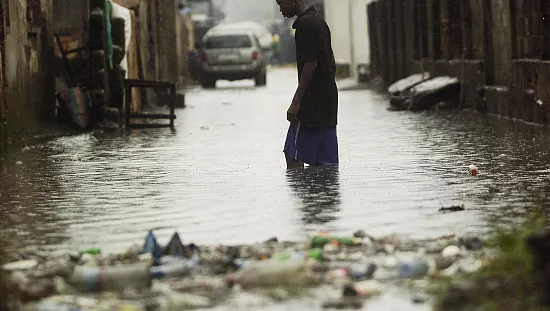Government representatives from the DR Congo visited Nyamukubi and Bushushu, two eastern communities that were ravaged by floods that claimed more than 400 lives in South Kivu.
According to an AFP team, they delivered coffins and supplies to the victims of the accident. This government contribution is considered “late” by the locals, as hundreds of remains have already been interred in mass graves.
“These coffins arrived late. We would have liked for them to arrive in time, it was important because we have already buried people like pigs, putting 3, 5, 10, 40 people in the same hole. But hey, we can’t help it, there are still bodies under the rubble that need to be found and maybe these coffins will be useful to bury them with honour.” Roger Nabusike, a resident of Nyamukubi said
The Red Cross also alluded to the claim that many that died had already been buried.
“We buried them in mass graves, but in a dignified and secure manner. For us, we say a dignified and secure way: securing not by the nature of the grave, but securing for the protection of the community against anything that can happen as a result of these bodies which may be decaying. ” John Kashinzwe, communication officer at the DRC Red Cross in South Kivu explained.
The UN’s division for humanitarian affairs estimates that some 3,000 families remain without a place to live. The Congolese government informed the populace that they would provide assistance and support. The governor of the South Kivu area, Théo Ngwabidje Kasi, stated that “each impacted family received more than one thousand dollars (USD)”. “The hospitals are going to be rescued and strengthened; we started at the local level and now we have relief (from the central government, editor’s note), but that is nothing compared to the needs,” the speaker said. Kasi threw in
Four days after the floods and landslides brought on by the torrential rains, relatives and rescuers in the area kept looking for undetermined numbers of persons who were still missing.
Congolese government spokesman Patrick Muyaya confirmed the death toll provided by the administrator of Kalehe territory in South Kivu province, where villages have been destroyed and bodies found in Lake Kivu.
Muyaya put forward a figure of 401 deaths during a weekly press briefing on Monday but did not specify the number of missing people, which local authorities say could be in the hundreds.
“I have lost 12 relatives, I’ve buried five bodies so far and seven others cannot be found,” Alpha Safari told AFP at Bushushu village.
“I am looking for them, I hope to find the bodies to bury them with dignity,” he said.
A wall of mud that fell down the mountainside on Thursday evening covers part of the village where homes and people were swept away, some into the nearby lake.
Youngsters dig into the earth. One covers his face. Another dead body has been found.
“The search continues because there are a great deal of bodies under the devastation,” a Red Cross worker said, asking not to be named.
“Every time we manage to demolish a house, we find bodies,” he added, deploring the lack of proper equipment to carry out the work.
– ‘No help’ –
“There were seven children in the family, but I’m the only one left,” said Darcein Bikanaba, another survivor at Bushushu. “My father and my mother have also gone and all my little brothers. “We have had no help up to now… We can’t stay here, it’s very dangerous.”
OCHA detailed “immediate needs” including for “dignified and safe” burials as well as medical care, food aid and shelter. Emergency teams from the United Nations and national NGOs have been brought in, OCHA said.
Greenpeace Africa noted that such disasters show “the necessity for the authorities to work on a national development plan focusing strongly on the risk of flooding in certain areas of the country”. Experts say extreme weather events are happening with increased frequency and intensity due to climate change. Eastern DR Congo’s disaster came two days after floods killed at least 131 people and destroyed thousands of homes in neighbouring Rwanda, on the other side of Lake Kivu.
On Saturday, UN Secretary-General Antonio Guterres on a visit to Burundi noted: “This is yet another illustration of accelerating climate change and its disastrous impact on countries that have done nothing to contribute to global warming.”





